Earth Community Economy
Osprey Orielle Lake
Wealth is a deep understanding of the natural world.
-Inuit wisdom
Many of us realize that we are at a crossroads both as a species and as a planet. On the current trajectory, our very survival and that of all future generations is at risk. Pivotal to navigating this particular human-made strait of dangers successfully is our ability to transform our relationships with each other and the ecosystems upon which our lives depend. Within this context, it is paramount that we swiftly transform our economic structures and institutions to better align with the natural laws of our Earth and the deeper core values shared by humanity.
In order to live in harmony with the Earth and to halt the most destructive aspects of our modern life, we need to advance a new economy based on the carrying capacity of our Earth and finite planetary boundaries. Recognizing that nature has rights can inform and help to legally re-enforce principles that counter a solely market-driven economy, instead fostering a new sort of sustainable economy–an “Earth Community Economy,” if you will–based on respect for natural laws and governance systems that uphold the rights and needs of nature in balance with the rights and needs of humans.
This way of “thinking globally” takes into account and includes the entirety of the Earth Community: human communities together with ecosystem communities of river, forest, desert, ocean, mountain–and all that those imply.
What can a system of earth jurisprudence (Rights of Nature) that views the natural world, Mother Earth, not as property, but as a rights-bearing entity with legal standing, offer a new Earth Community Economy?
Rights of Nature laws would require a fundamental redirection of the world economy, necessitating that we adhere to precepts that uphold the ecological design and boundaries of nature. Recognizing that Nature has rights means that human activities and development must not interfere with the ability of ecosystems to absorb their affects; to regenerate their natural capacities; to thrive and evolve.
As an example, current extractive practices like mountaintop removal to obtain coal, which destroys entire mountain and watershed ecosystems, would be categorically illegal. So too would industrial agriculture practices that poison soil and water, genetically alter natural species, or cause loss of biodiversity. To this we can add any industrial activities that pollute the ecosystem of the atmosphere.
Consequently, employing a Rights of Nature framework will encourage an economic transition to renewable energy, the reduction of greenhouse gas emissions, the investment of resources in energy efficiency, and organic/diverse agriculture–all of which can support healthier ecosystems and promote vibrant local economies. Rights of Nature laws require that those responsible—including corporate actors—be held accountable for negative environmental impacts, thereby encouraging economic models and practices that respect the natural limits and laws inherent to the natural world we inhabit.
Additionally, within a Rights of Nature framework, laws will be conducive to revealing the true costs of industry because it means corporations and individuals would be required to take responsibility for costs associated with any effort needed to ensure and protect the integrity and wellbeing of ecosystems for the entire cycle of activities of production and transportation–costs which have previously been externalized and passed on to others. A “true cost” economic model will drive industry toward sustainable activities and practices because it becomes cost-prohibitive, as well as just plain prohibited, to pollute and harm Nature.
It is important to note that acknowledging and enforcing Mother Earth Rights does not stop necessary development for the wellbeing of human communities, but rather reorients these inevitable developments to simultaneously protect ecosystem balance and respect the regenerative capacity of Nature’s vital cycles. Indigenous communities worldwide have been demonstrating “sustainable development” for thousands of years; this is not a new understanding. Because of this, we need to do everything we can to protect these Indigenous communities for their own sake but also because we have so much to learn from their longstanding example.
What we have learned in the past decades is that an economic system based on infinite physical growth and development on a finite planet is irrational and simply not sustainable. As Prime Minister Jigmi Thinley of Bhutan stated in his 2012 address at the United Nations High Level Meeting on Wellbeing and Happiness, “The GDP lead development model that compels boundless growth on a planet with limited resources no longer makes economic sense.”
Rights of Nature legislation will encourage the formulation and implementation of new economic indicators such as Gross National Happiness, Genuine Progress Indicator, Index of Sustainable Economic Welfare and others that do not rely upon GDP as the only true or acceptable metric. We must question defining worth, wealth, value, and wellbeing based on only the measuring of money and quantities of material goods. The vital force of life itself and human happiness cannot be forced into a monetary system; they do not equate.
What might this new economics look like and what do we need to be thinking about as we seek a transition?
Around the world, we are seeing the emergence of creative alternatives to destructive economic paradigms. The good news is what is healthy for an ecosystem is also good for people: a key ingredient is localization and regionalism. The best economic and environmentally sound solutions are place-based, diverse according to region, and are responsive to local communities and social needs. Instead of fearing a transition to an Earth Community Economy, we can support and enjoy local organic food, vibrant local businesses, a healthy local economy, jobs with justice and the development of clean decentralized energy.
No, not Utopias, but regenerative, functional, local communities. Already we are seeing a plethora of creative, self-organizing groups and their ideas on the move with this concept: Transition Towns, Eco-builders, Cool Cities, Eco-villages, Eco-Cities, permaculture communities, food sovereignty groups —the list grows daily with working concepts and models in every part of the world.
History and logic dictate that transitioning away from a globalized economy will not always be smooth or easy—not was the transition from the slave system following the US Civil War. Yet our survival depends on our ability to do so, and quickly.
We must change the way we think about what an economy is for, and how we measure it. Today, we measure economic well-being using flawed instruments such as the GDP. Yet even the generation and dumping of toxic waste is part of the GDP—a wildly inaccurate measure of progress. We must begin to develop new metrics like the Gross National Happiness Index, which assesses economic performance based on the health and wellbeing of people living in balance with each other and nature.
Cultures living close to the Earth have shown a balanced way of life quite unlike newer, consumer-driven notions of simply having more. “Living well” in the Kichwa language of the Indigenous people of Ecuador, is called “sumak kawsay;” in Spanish, it is “buen vivir.” The Buryat people of the Lake Baikal region express it this way: “To live a life of honor is to live with tegsh,” meaning to live in appreciation and balance with all of life. An Earth Community Economy envisions a future that has not come from enslaving Nature and treating all other life as mere resources for human exploitation and unchecked material growth.
A Rights of Nature legal framework would foster human wellbeing in harmony with the integrity and functioning of the entire Earth community, thus prompting economic incentives and disincentives aligned with this purpose. An Earth Community Economy recognizes the inherent meaning, sacredness and value of the natural world: that which is not tradable or subject to commerce. To this end, in order to truly protect our Earth, we must stop the commodification and financialization of nature.
While a Rights of Nature framework does not solve all of our daunting problems, it does offer a foundation upon which healthy economic principles and sustainability can be built. Advocating for a systemic economic alternative that balances the rights of human communities with the rights of ecosystems should be at the heart of all international sustainable development and climate negotiations—an alternative to the so called “green economy.” As we look to completely transform our responsibilities and relationship with the natural world, this Earth Community Economy based on Rights of Nature is an idea and a necessity whose time is now.
Osprey Orielle Lake is the Founder/President of the Women’s Earth and Climate Caucus (WECC) and an International Advocate for the Global Alliance for the Rights of Nature. Her book, Uprisings for the Earth: Reconnecting Culture with Nature (White Cloud Press) is a 2011 Nautilus Book Award winner.
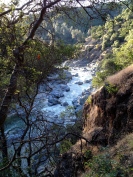 work interdependently. To allow only one species to dominate this system ensures it’s destruction. I know to many of my readers it seems strange to think of giving rights to nature. It was also once unthinkable to give rights to women, to slaves, in fact the idea of human rights was also beyond comprehension. It is now time to think about giving rights to trees, rivers, oceans, glaciers and the thousands of species that become extinct every year. Isn’t it time to respect and honor the rights of all life on this mother of all life, our living, breathing and beautiful planet Earth? This is an idea whose time has come! We have the opportunity to imagine and create a major paradigm shift. Let’s make this is the defining issue of our time.
work interdependently. To allow only one species to dominate this system ensures it’s destruction. I know to many of my readers it seems strange to think of giving rights to nature. It was also once unthinkable to give rights to women, to slaves, in fact the idea of human rights was also beyond comprehension. It is now time to think about giving rights to trees, rivers, oceans, glaciers and the thousands of species that become extinct every year. Isn’t it time to respect and honor the rights of all life on this mother of all life, our living, breathing and beautiful planet Earth? This is an idea whose time has come! We have the opportunity to imagine and create a major paradigm shift. Let’s make this is the defining issue of our time.
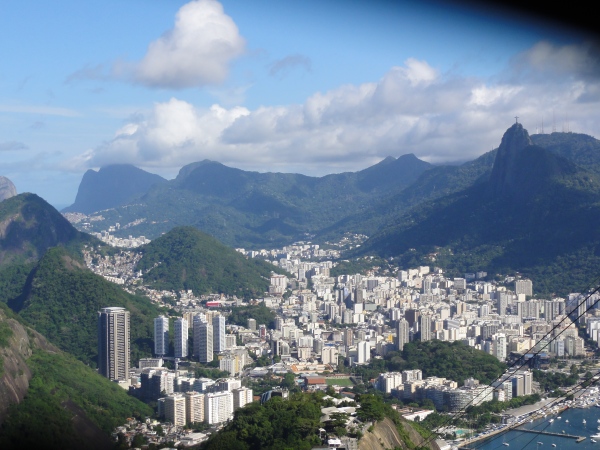

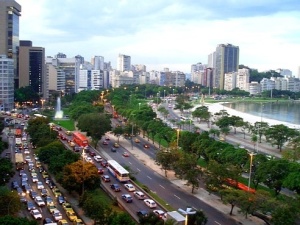
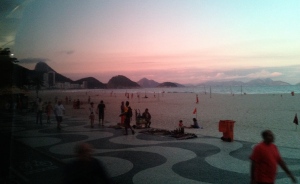
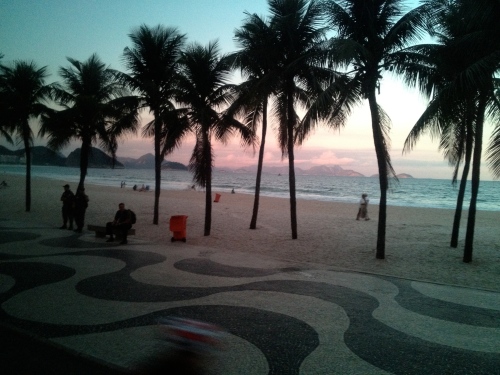
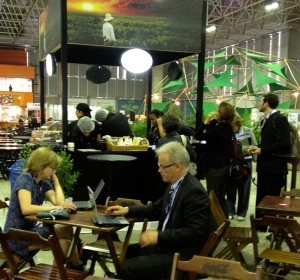
 On Saturday I will be leaving for Rio to cover the UN and People conference on Climate Change. This is the 20th Anniversary of the original Rio Earth Summit and I will be covering it for KVMR and you. Please stay tuned. We are reactivating the blog to keep you informed. I am looking forward to sharing this historical event as it unfolds…
On Saturday I will be leaving for Rio to cover the UN and People conference on Climate Change. This is the 20th Anniversary of the original Rio Earth Summit and I will be covering it for KVMR and you. Please stay tuned. We are reactivating the blog to keep you informed. I am looking forward to sharing this historical event as it unfolds…